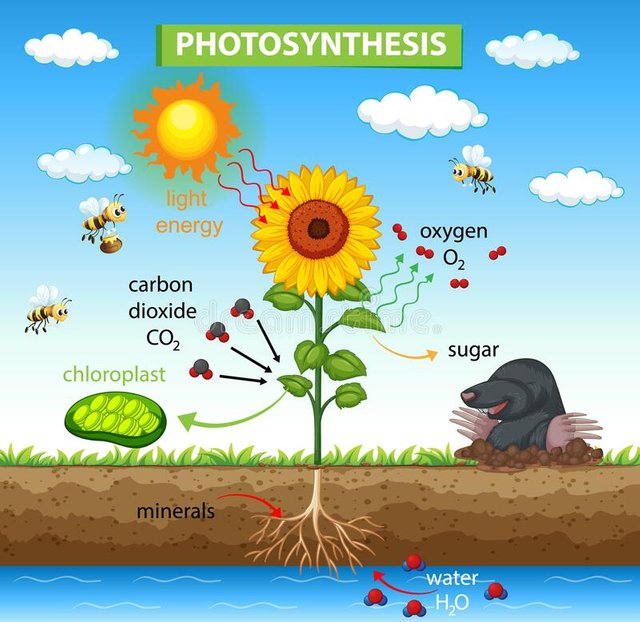🌱Let's talk about photosynthesis 🌱
There are living things that, like green plants, produce their own food. These organisms are known as autotrophs. Other organisms, such as animals, cannot produce their own food, so they must take it from the remains or parts of other organisms. Either animals or plants, these organisms are known as heterotrophs.
🌱Plants make their own food🌱
In the development of this function, so important for plants as for animals, green plants require taking from the environment that surrounds them water, mineral salts and carbon dioxide. With these materials and the energy from sunlight, plants make their own food.
🌱The plants and the substances they need🌱
The water and mineral salts are taken from the soil by the roots, from where they will then pass to the leaves through the stem. Carbon dioxide and sunlight, on the other hand, are captured directly by the leaves, where the food will be produced.
🌱Water and mineral salts inside the root 🌱
Once in the root, the water with the dissolved mineral salts, which constitute what is known as "raw sap", passes into a set of conduits or tubes that start at the root, and are known as woody vessels. These conduits continue along the stem and the leaves, being through them as the raw sap will finally reach you. The woody vessels together constitute a plant tissue, which is known by the name of xylem.
🌱Carbon dioxide and plants 🌱
Carbon dioxide is one of the gases present in the air around us. Plants, mainly on the underside of leaves, have small holes called stomata, which are responsible for the exchange of gases between plants and the environment that surrounds us. Through stomata, plants capture carbon dioxide from the air.
🌱Sunlight and plants🌱
Inside the leaves there are structures called chloroplasts, which contain a green substance, which gives the leaves precisely that color, which is known by the name of chlorophyll. This is the substance that captures sunlight, using it to form food from carbon dioxide and water, through photosynthesis. When sunlight falls on the leaves, it reaches the chloroplasts, acts on the chlorophyll contained in them, and thus begins photosynthesis.
🌱 Photosynthesis 🌱
Once the chlorophyll captures sunlight, a series of chemical changes begins in the chloroplasts, in which the water absorbed by the roots and the carbon dioxide taken from the environment by the leaves participate. Through these chemical changes, sugars are made and oxygen is released into the atmosphere. This process is called photosynthesis.

Nice to read your post .
Keep Posting and Stay With Our Community.
Thank You
Thank you!!